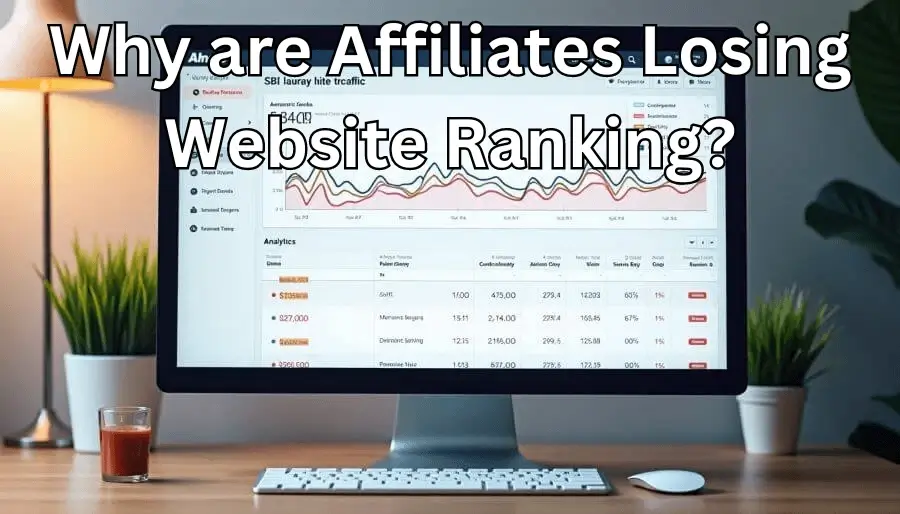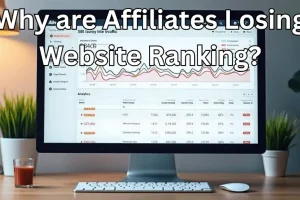Why are so many affiliates losing website ranking? The recent Google March update 2024 has sent shockwaves through the affiliate marketing world, leaving many website owners scratching their heads about their plummeting rankings. There has been a significant shift in how search engines evaluate and rank affiliate sites, especially Google, with brand recognition playing a more crucial role than ever before. This change has caused a profound impact on the affiliate marketing landscape, forcing us to reconsider our strategies and adapt to the new reality.
Another reason behind the decline in affiliate site rankings is the growing importance of E-E-A-T (Experience, Expertise, Authoritativeness, and Trustworthiness) in search engine algorithms. Likewise, PR and SEO in search has become a key ranking factor. In this article we cover all about it, plus a little bit more.
Decoding the Recent Decline in Affiliate Site Rankings
Recently, our team of expers observed a significant shift in the affiliate marketing landscape following Google core March update. This update, which took 45 days to roll out, has had a profound impact on many affiliate sites losing website ranking, causing what some have described as “blogger carnage.”
The March update targeted unhelpful content at a page level, building on the Helpful Content Update from September 2023. We’ve also noticed that sites focusing solely on keyword optimization and traffic from Google have been hit hardest. This suggests that Google is now prioritizing sites that offer a holistic user experience rather than those that simply target search algorithms.
Key Factors Contributing to Ranking Losses
Several factors have contributed to the decline in affiliate site rankings:
- Over-reliance on AI-generated content (not optimized)
- Poor user experience, including slow load times and intrusive ads
- Lack of original, high-quality content
- Excessive use of backlinks, especially from low-quality sources
Identifying Patterns Across Affected Sites
We’ve identified some common patterns among the sites that have experienced ranking losses:
- Focus on keyword optimization rather than user intent
- High average position on Google Search Console for easy-to-rank keywords
- Lack of clear topic clusters and comprehensive content coverage
- Low user engagement and short on-site time
What Google basically says is to recover from this update, we need to shift our focus to creating high-quality, user-centric content that provides real value to our audience. It’s crucial to develop a comprehensive content strategy that keeps users engaged, and making them stay longer, rather than relying solely on SEO tactics to drive traffic.
The Rise of Brand Search as a Ranking Factor
Because of the major shift in Google’s ranking systems and the importance of E-E-A-T, brand search has emerged as a crucial factor in determining how high your site will rank. This change has had a profound impact on how we approach SEO and digital marketing strategies.
What is Brand Search?
Brand search refers to queries that include a company’s name or branded elements. For example, searches like “Betyep odds” or “REI tents” are considered co-branded searches. We’ve noticed that these searches can influence rankings not just for the branded terms but also for non-branded keywords associated with the brand.
How Google Evaluates Brand Strength
Google uses various signals to assess a brand’s strength and relevance. Some key factors include:
- Branded anchor text in backlinks
- Volume of branded searches
- Social media presence and engagement
- Unlinked brand mentions
- User behavior signals, such as click-through rates and time spent on site
These factors correlate strongly with higher rankings, even though Google doesn’t explicitly favor well-known brands in its algorithm.
Case Studies: Brand Search vs. Traditional SEO
Furthermore, our research has shown that brand awareness can be more influential than traditional SEO metrics. For instance, a study by Moz revealed that branded search volume has a stronger correlation with rankings than Domain Authority.
We’ve also observed that co-branded searches can lead to rapid ranking improvements. For example, in one of our cases, a commercial campaign resulted in a 1-3 position lift for related keywords within days. Though this effect was geographically limited and temporary, it highlighted the dynamic nature of brand-influenced rankings.
Integrating PR and SEO for Affiliate Success
Combining PR and SEO efforts can have a significant impact on your affiliate success. By aligning these two strategies, you boost your online visibility, increase brand awareness, and potentially drive more sales. Let’s explore how to effectively integrate PR and SEO to enhance your affiliate marketing efforts.
Developing a Unified PR-SEO Strategy
To create a cohesive approach, combine SEO and digital PR teams together. By collaborating on content creation, you can enhance both the brand image and search rankings. This unified strategy should focus on developing high-quality, newsworthy content that aligns with your SEO goals.
Likewise, when PR and SEO work in tandem, every brand message has the potential to capture attention and improve trustworthyness. It’s crucial to understand that both PR and SEO are about building authority, albeit in different ways. By leveraging the strengths of both, you can create a more powerful and effective marketing strategy.
Creating Newsworthy Content
To integrate SEO into your PR activities, focus on creating content that’s not only newsworthy but also optimized for search engines. This approach helps you earn valuable mentions and backlinks across multiple channels, which are vital for increasing organic search rankings.
When developing content, consider the following:
- Focus on topics that align with your brand and have search potential
- Incorporate relevant keywords naturally within your PR materials
- Create content that answers common questions in your niche
- Develop comprehensive topic clusters to establish authority in specific subjects
Leveraging Expert Positioning
By positioning yourself as an expert in your field, you can enhance both your PR and SEO efforts. Here at Pugu Digital, we’ve found that when our PR campaigns are successful, the trust and authority we gain transfer to our sites, which Google takes note of. This can lead to improved search rankings, as search engines prefer to show trustworthy, high-quality sites in their results.
To leverage expert positioning effectively, you should:
- Contribute guest posts to reputable industry publications
- Participate in interviews and podcasts related to your niche
- Share your expertise through social media and influencer outreach
- Develop comprehensive, authoritative content on your own platform
By integrating these strategies, you can create a powerful synergy between your PR and SEO, ultimately driving more success in your affiliate marketing endeavors.
Actionable Steps to Improve Brand Search
During the last months of research our team identified several key strategies to enhance brand search and improve our website ranking. By implementing these steps below, you can avoid losing website ranking, and instead improve your online visibility and strengthen your brand’s reputation.
Conducting PR Studies
To strengthen the brand’s reputation, focus on digital PR. This process helps to build and maintain a positive online presence across various channels. By creating and distributing high-quality, relevant content, you can increase your visibility, authority, and credibility. You should aim to engage with influencers and media outlets to earn valuable backlinks and brand mentions. This approach not only improves the overall SEO performance of your website but also expands the reach to a wider, more diverse audience.
Engaging with Industry Publications
To not lose website ranking, identify and research publications and influencers that are relevant and influential in your niche. It’s crucial to craft personalized, compelling pitches that highlight the value of your content for these publications. However, be aware that many publishers might require payments for inclusion in their articles. Therefore, consider developing partnerships to increase your chances of being featured in product roundups and reviews.
Building a Strong Social Media Presence
To improve your brand search, you need to establish a robust social media presence. You should aim to spend significant time on social media platforms, as the average person spends 144 minutes daily on these channels. By consistently posting engaging content and interacting with your followers, you can build trust and grow your audience. Use tools like social media schedulers to plan and post content at optimal times, ensuring stay active without being constantly online.
Conclusion
Due to the Google March update, the shifting landscape of affiliate marketing demands a new approach to maintain and improve website rankings. Google’s recent updates have placed a premium on brand recognition, user experience, and high-quality content. To succeed, we need to focus on creating valuable, user-centric content that goes beyond mere keyword optimization. Building a strong brand presence through integrated PR and SEO strategies has become crucial to boost your online visibility, and establish authority in your niche.
To adapt to these changes and not lose website ranking, focus on developing a unified SEO strategy. Create newsworthy content, and positioning yourself as an expert in your field. Remember, success in this evolving landscape comes down to providing real value to your audience while strategically building your brand recognition.



















